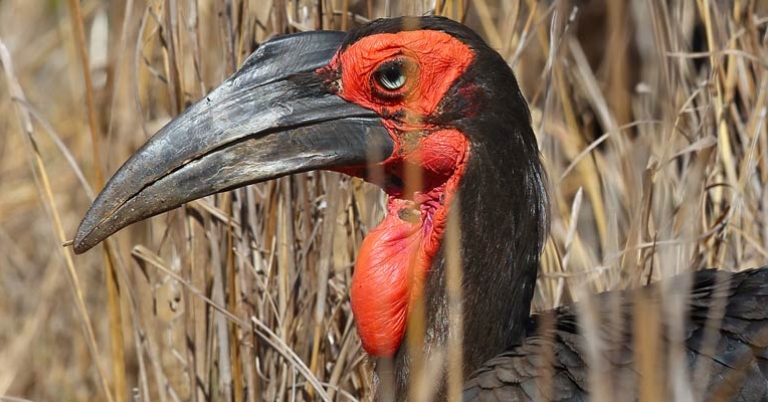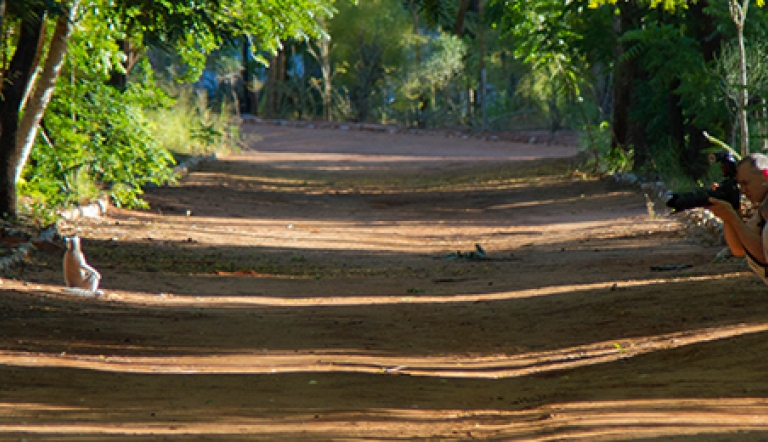Zimbabwe | Victoria Falls Exploration Post-trip Extension
About this trip
Extend your wildlife safari experience by joining this optional 4-day post-trip adventure to one of Southern Africa's most breathtaking natural wonders: Victoria Falls. Explore the sprawling wetlands and woodlands of Zambezi National Park before taking in the majestic scenery of Victoria Falls, the world's largest sheet of falling water—whose local name aptly translates to "thundering smoke.”
This special trip is open to everyone, and your participation benefits the Climb for Cancer Foundation. The Foundation's travel program plays an important role in fundraising to support cancer patients and their families, while allowing explorers to check off bucket list travel experiences.
Highlights
- Marvel at stunning views and fascinating wildlife on a dinner cruise through the Zambezi River.
- Venture on a walking safari in Zambezi National Park to learn about the area's flora and fauna and spot many different animals, including the Big Five.
- Witness the magnificent Victoria Falls, a UNESCO World Heritage Site at the border of Zimbabwe and Zambia.
OPTIONAL EXTENSIONS: Combine this trip with one or both of Climb for Cancer’s other Africa trips: Uganda (Aug. 14-20) | Tanzania (Aug. 20-29)
PLEASE NOTE: The Climb for Cancer Foundation is pleased to offer these three African trips, single or combined, to raise donations for oncology programs. Your generous support helps us provide comfort and hope to cancer families in need. A minimum $500/person donation is required for one or all of the trips. We are so grateful for your support, and promise to be responsible stewards of both your donation and trust. Thank you in advance for your tax deductible donation.
Meet your leader
Ron Farb
Educated at the College of William & Mary, and a former military aviator, Ron Farb has traveled to every continent and more than 50 countries. Ron has climbed the highest mountain on five of the seven continents, including Everest, Aconcagua (twice), Denali, Elbrus, and Kilimanjaro (seven times). By doing so, the Climb for Cancer Foundation, created by Ron and his wife Dianne in 2003, has raised more than $3 million to support cancer patients and their families.
 About Climb for Cancer
About Climb for Cancer
The Climb for Cancer Foundation’s mission is to provide patient-centered support and fund the underserved needs of the cancer patients and their families, the clinical staff who treat them, and the social workers, child life specialists, and others who assist them in their cancer journey.
The small Foundation has made a tangible impact on the lives of many people fighting the disease, and has funded or created several psycho-social programs which provide support to the patient and the family. The Foundation likes to think that its gifts fill in the cracks left by organizations that make much larger gifts.
$2,895
Per person
About this price
Land cost only. Does not include round-trip airfare to and from destination.
Single room supplement $755
What makes us different
Wildlife up-close
Service anytime
Meaningful experiences
Low stress travel planning
Expert guides
Flight arrangements
Daily Itinerary
Print ItineraryAddis Ababa
Victoria Falls, Zimbabwe
Victoria Falls, Zimbabwe
Pricing
Print Pricing$2,895
Per person
About this price
Land cost only. Does not include round-trip airfare to and from destination.
Single room supplement $755
What's Included
- Accommodations with private bathrooms
- Activities and meals as mentioned in itinerary
- Airport transfers
- Water refill station during transfers
- Full time guide for the duration of your program
- Non alcoholic beverage with meals
What's Not Included
- Airfare not included
- Items of personal nature
- Tips
- Travel Insurance
Pricing Details
A $200 per person deposit and enrollment form is due to hold your space on this trip. This deposit is refundable 95 days prior to departure excluding a $100 cancellation fee. Cancellations after this date are non refundable.
Holbrook Travel strongly recommends the purchase of travel protection for medical emergencies while traveling and to protect your investment. Please note the purchase of Cancel for Any Reason Coverage or to exclude pre-existing conditions with Trip Cancellation coverage may require policy purchase within 10-14 days of your initial deposit, depending upon the provider.
Single room supplement $755
Final payment due date: May 25, 2024
Travel Info
Print Travel InfoEntry & Exit Requirements
U.S. citizens must have a valid passport to enter Ethiopia and Zimbabwe. Passports must be valid for at least 6 months beyond your date of departure from Ethiopia and Zimbabwe. Your passport must have at least 3 blank pages in addition to the 1 blank page required for the main program in Tanzania (1 for Ethiopia, and 2 for Zimbabwe). In other words, if traveling on both the main program and the extension, you must have a total of 4 or more blank passport pages.
Ethiopia requires a transit visa for all travelers whose flights are between 8 and 24 hours long and without immediate connecting flights to continue their journey. The interline desk at the airport will facilitate transit visas upon arrival for all eligible travelers, as well as hotel accommodations and bus transfers to and from the hotel upon approval of the transit visa. The visa fee is around USD $30.
Zimbabwe requires a tourist visa for entry, which may be obtained at the port of entry on arrival. The fee is USD $30 for a 30-day, single-entry visa.
If you are not traveling with a U.S. passport, please check with the embassies of Ethiopia and Zimbabwe for the requirements based on your nationality.
Health Information
IMMUNIZATIONS
The Centers for Disease Control recommends that all travelers be up to date on routine vaccinations such as measles-mumps-rubella (MMR) vaccine, diphtheria-pertussis-tetanus vaccine, varicella (chicken pox) vaccine, and your yearly flu shot before every trip.
Zimbabwe requires yellow fever vaccinations for travelers who have visited countries where yellow fever transmission is a risk (including spending 12 or more hours in an airport located in a country with yellow fever transmission). This yellow fever risk list includes the region of Ethiopia you will visit on the first day of this extension program, so proof of yellow fever vaccination is required. Ethiopia also requires proof of yellow fever vaccination for travelers who have visited other nations where there is risk of transmission.
Though not required for entry, the CDC recommends vaccination against hepatitis A, hepatitis B, and typhoid for most unvaccinated travelers to Ethiopia and Zimbabwe. In addition, the CDC advises some travelers to consider a polio booster and rabies vaccine.
Additional vaccines may be recommended based on your individual circumstances. Please consult your physician for more information.
MALARIA
The CDC warns that travelers to Zimbabwe and certain regions of Ethiopia—not including Addis Ababa—may be at risk for exposure to malaria.
Malaria is caused by a parasite found in Anopheles mosquitos, which are active from dusk until dawn. Prevention is twofold: the use of anti-malarial drugs and the prevention of insect bites. To protect against insect bites, cover exposed skin with lightweight, long-sleeved shirts and pants, consider treating clothes with permethrin, and use an insect repellent containing an active ingredient like DEET or picaridin. Apply sunscreen first, followed by the repellent (preferably 20 minutes later). If you choose to use an anti-malarial drug, as recommended by the CDC, see your physician for a prescription.
OTHER Vector-BORNE ILLNESSES
In addition to malaria, the CDC advises that travelers may be at risk for other illnesses transmitted by insects and ticks, such as chikungunya, dengue fever, African tick-bite fever, and others. Travelers are advised to protect themselves against bites using the measures noted above.
After spending time outdoors in grassy or wooded areas, the CDC recommends showering and conducting a full-body check for ticks. If you find a tick attached to your skin, safely remove it as soon as possible.
Cholera
According to the CDC, cholera is widespread in Zimbabwe and presumed to be present in Ethiopia but is rare in travelers. To help avoid exposure to cholera, wash hands frequently. Drink bottled water, carbonated bottled/canned drinks, or steaming hot drinks like tea or coffee; avoid tap water, fountain drinks, and ice cubes. Avoid raw fruits and vegetables, and be cautious with street food.
Wildlife
Follow all instructions from your guides regarding wildlife. Animals may become aggressive to protect themselves, their young or their mates, or to guard a food supply. Do not make sudden movements either toward or away from them, as this may be interpreted as threatening or territorial.
Avoid stray dogs, as they may carry rabies. In the unlikely event of being bitten or scratched by a dog or other mammal, clean the wound and control bleeding. Seek medical attention immediately.
SUN EXPOSURE
The effects of the sun can be damaging to the eyes and skin. Spending time outdoors exposes you to the sun’s harmful ultraviolet (UV) rays, even on cloudy days. To protect yourself from the sun, use a broad spectrum sunscreen of at least SPF 15, protect skin with clothing, wear a wide-brimmed hat and sunglasses, and drink plenty of fluids.
Resources
Print ResourcesPacking Recommendations
Everyone has personal preferences when it comes to packing; for this reason, the information below is offered as a general guide and not a definitive list. You know yourself best: Use your discretion and pack what you think will serve you, based on your personal preferences and specific itinerary.
You may find many of the items below in our Gear Store.
CLOTHING
Casual, comfortable clothing is suitable for most activities. Bring enough clothing suitable for the length of your program. If you prefer to pack light, note that many hotels offer laundry services (at additional cost).
Pack clothing that can be worn in layers to adapt to weather changes throughout the day. Remember that seasons in the Southern Hemisphere are reversed from those in the north. Hence, July and August are the middle of winter. The region's rainy season is October to April, but it can rain at any time.
For wildlife viewing drives, bring clothes in neutral or muted colors such as green, khaki, brown, or gray. We recommend that you avoid wearing bright colors or white as they can easily be spotted by animals. In addition, blue is particularly attractive to certain insects and should be avoided.
Army-style camouflage clothing is illegal in Zimbabwe.
Locals tend to dress conservatively. Revealing tank tops and shorts/skirts cut above the knee are typically not recommended in towns.
- A combination of short-sleeved and lightweight, long-sleeved shirts for sun and insect protection
- Shorts and/or skirts
- Lightweight, quick-drying long pants for sun and insect protection; warmer long pants if your itinerary visits colder areas
- Undergarments
- Sleepwear
- Lightweight jacket or sweater/sweatshirt – it can chilly at night and in the early morning
- Socks – Bring extra pairs.
- Shoes – You’ll likely want at least one pair of comfortable, closed-toe walking or hiking shoes or boots suitable for hikes and walking over uneven terrain. In addition, many participants opt for a pair of sturdy sport-strap sandals (e.g. Keens, Tevas, or similar) and/or casual flip-flops or sandals for around your accommodations.
- Lightweight rain jacket, hooded poncho, and/or windbreaker
- Visor or wide-brimmed sun hat
- Bandana, scarf, or neck gaiter
Personal Toiletries
Pack toiletries based on your personal preferences and habits. Below are just a few recommendations to keep in mind.
- Shampoo, conditioner, lotion, deodorant/antiperspirant , etc. – If possible, avoid strong fragrances if you are sensitive to insect bites (and to be considerate of you fellow travelers).
- Soap and washcloth or a small, quick-drying microfiber towel – Washcloths are not standard in all hotels. If you normally use a washcloth, you may wish to bring one from home.
- Hairbrush, comb, hair ties, shower cap. Some hotel rooms provide a hair dryer, but you may wish to bring one from home.
- Toothbrush and toothpaste
- Razor
- Ear plugs, especially if you are a light sleeper
- Personal hygiene products
- Insect repellent with DEET or picaridin (see note below about treating clothing with permethrin)
- Sunscreen and lip balm with SPF – If you’ll be in the ocean, we recommend reef-safe sunscreen.
- Aloe vera gel
- A travel pack of tissues – also useful as napkins or toilet paper if needed
In addition to your personal toiletries, it is useful to pack a small medical kit, which you can easily prepare. Helpful items might include: bandages, antihistamine, a pain reliever, motion sickness and/or altitude sickness medication (if you are prone to either), anti-diarrhea medicine, individually wrapped pre-moistened towelettes and/or hand sanitizer, antibiotic ointment, anti-fungal cream, moleskin for blisters, eye drops, tweezers, a mini sewing kit, and an extra pair of disposable contact lenses or eyeglasses if you wear them.
Days before you leave home, you may wish to consider spraying any clothing, socks, and shoes that will be worn in lowland, tropical sites with permethrin, an anti-parasite medication, to repel irritating pests and prevent the spread of disease. A recommended brand is Sawyer. Carefully read all instructions before use. Please note permethrin is highly toxic to cats and fish, and some aerosol products may be harmful to birds. Side effects may include minor itching, burning, or redness. You may want to use a laundry marker to label and keep track of which socks are permethrinized. Only one application per item is necessary; permethrin on treated clothes remains effective through several washings. Permethrin should NOT be applied directly to skin.
Miscellaneous
Remember to pack valuables such as your passport, cash/credit cards, and medications in your carry-on luggage.
- Passport and photocopies of all travel documentation
- Personal insurance card and travel insurance information
- Money – ATM/credit card, traveler's checks, and/or cash; small bills in good condition are recommended
- Prescription medicines (if applicable), with a copy of the prescription
- Yellow fever certificate (if required; only if arriving from a country where yellow fever transmission is a risk)
- Sunglasses with strap
- Small day pack for hikes and excursions
- Flashlight and/or head lamp
- Travel alarm clock or inexpensive waterproof wristwatch with alarm – Not all hotels provide alarm clocks.
- A pocket calculator or phone to assist with conversions and currency exchange
- Binoculars with lens cleaner
- Camera and related equipment, such as charger, lenses, and extra memory cards
- Reusable water bottle
- Non-perishable snacks
- Pocket-knife or multipurpose tool – Pack in your checked luggage.
- Zip-top style bags – useful for packing toiletries, sorting clothing, storing damp or muddy shoes, or as a dry bag for protecting electronics
- Notepad or travel journal and pen
- Music or reading material for down time, long bus drives, or on the airplane, and a portable bright light to read by
- Collapsible walking stick with rubber tip
- A small quantity of laundry detergent if you’ll be washing clothing by hand
- Money belt
- Voltage converter, plug adapter, and chargers for electronics

Questions
Contact Ron Farb at 352-333-9663 or Lisa Palmese-Graubard at 800-451-7111 x339 | lisa@holbrooktravel.com













